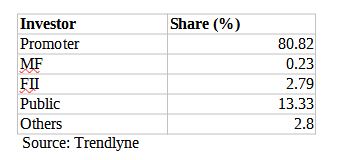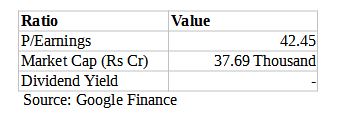Stock at Stake: Patanjali looking to dominate FMCG space
Currently with a focus on make in India and higher nationalism, as and when consumers will shift towards the organized sector they are likely to opt for Patanjali projects
- shaurya.bishnoi
- Last Updated : June 15, 2023, 16:10 IST

In the news:
Patanjali is in the news after it revealed a plan for expansion of its different businesses be it FMCG, oil palm plantation on the horizon. The company has also prepared a vision document as it aims to dominate the FMCG business. Baba Ramdev said in an interview with PTI that they aim to achieve Rs 5,000 crore EBITDA and turnover of Rs 50,000 crore in the next five years. So with this background let’s take a deep dive into the business of Patanjali Foods Ltd.
External Sector:
FMCG sector as a whole is on the revival path after facing some tough quarters in recent times. Performance in rural areas was dismal, now there is some hope but El Nino may play spoil sport. However, research agency Bizom has reported that in May it was opposite as rural sales increased 2.2% (YOY) while sales in urban areas grew at 1.4%.
Company’s Business:
Company is part of Patanjali Group that is diversified conglomerates dealing in various businesses. It has 43 manufacturing units, 25 processing plants (19 out of them are reported to be operational) across India.
Food Business:
– 8 categories, 242 products.
Nutraceuticals:
– Sports Nutrition
– Medical Nutrition
– General Nutrition
Oil Palm Plantation:
– Allocated area of 6.23 lakh hectare
– Cultivation under 62,102 hectare
Edible Oil
– One of the leading edible oil company
– Brands like Ruchi Gold, Nutrela, Ruchi Star
Others
– Oleochemicals
– Windpower
Sareholding Pattern (As on 31st March 2023):

Growth Drivers:
– Company looking to use its strong brand in oil segments like Ruchi Gold, Mahakosh and Sunrich for gaining market as it would try to gain market share from regional unbranded players
– Merging the food business to create synergy by reducing overhead costs and providing economies of scale
– Backward integration would ensure quality products and lower the whiplash effect of price volatility.
– Presence across the value chain to help in better tracking of the whole supply chain.
– Helping farmers through the palm plantation program will lead to better relations.
– In the current economic and political environment, working on reducing palm oil imports would provide multifold benefits to the company in the form of better relations with all the stakeholders of society
Competitive Advantage:
– Company is the epitome of ayurvedic products, after the covid focus on health care products has increased
– Its various products are market leaders in their category
– Currently with a focus on make in India and higher nationalism, as and when consumers will shift towards the organized sector they are likely to opt for Patanjali projects
– Giving them distinct brand loyalty even among untapped consumers
– At present, MNCs are seen as profit-hungry jackals that exploit all stakeholders ranging from customers, workers, small suppliers and vendors. Patanjali has an image of being a customer-centric firm that values all stakeholders. Maintaining the image will ensure customer retention
– Its focus on efficiency, debt reduction and coherency shows the discipline of management
– Company has decentralized decision-making. Leading to more agility and quick decision-making during a dynamic business environment
– Automation will increase knowledge of a firm, making it more and more difficult for competitors to imitate
– Vertical integration will further aid in increasing the technical know-how of the firm. Leading to both economies of scale and scope.
Risks:
– Cultural issues can also arise in digitization which can reduce the pace of automation in business
– Not much focus on advertisement and customer analytics
– This can become a huge-issues as competition is intensifying with prescence of Reliance and Adani in the space
– In FMCG space different brands are synonyms with products. So it will be difficult for Patanjali to gain meaningful share in biscuits, instant noodles etc
– All this may lead to price wars, lower bargaining power with suppliers and distributors
Financials

Valuation Ratios

Download Money9 App for the latest updates on Personal Finance.
Related
- HUL का पहली तिमाही में शुद्ध लाभ 5.97 प्रतिशत बढ़कर 2,768 करोड़ रुपये
- ये डिफेंस कंपनी बढ़ाने जा रही 10 गुना प्रोडक्शन, ऑर्डर बुक दमदार, शानदार फ्यूचर प्लान!
- Budget’24: LTCG gains tax hiked, but here’s you can save more on your investments now
- India should have no capital gains tax: Jefferies’ Chris Wood on Budget’24
- UBS Ratings: Maintains ‘buy’ for Zomato, upgrades Federal Bank
- SIP vs. STP: Which can earn you more money?

